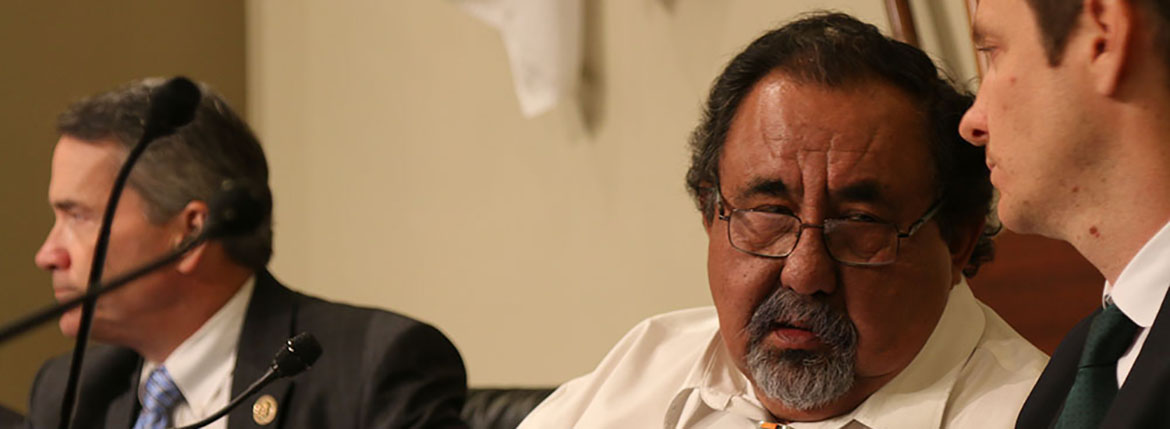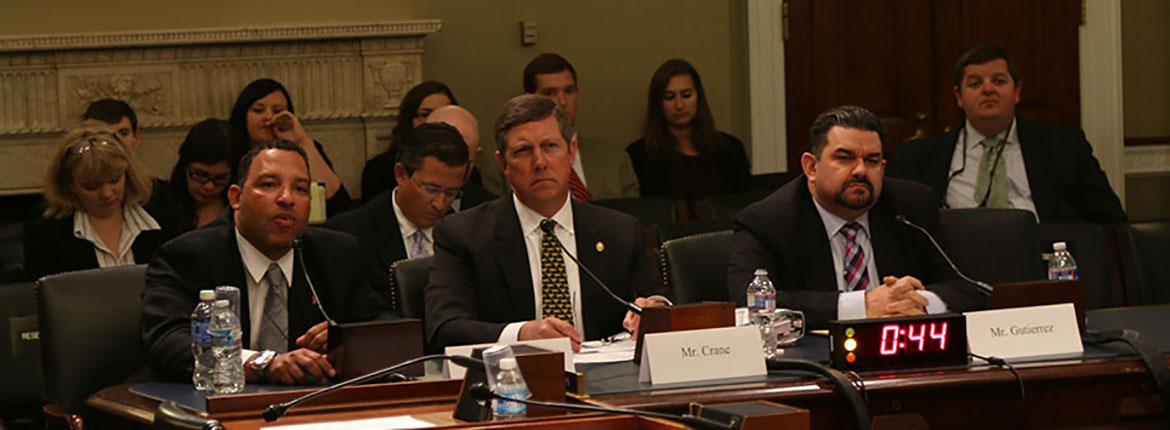
Rep. Raul Grijalva, D-Tuscon, at a House Natural Resources subcommittee hearing on a bill aimed at protecting hunting on federal lands, a proposal that Grijalva said is overkill. (Photo by Jamie Cochran)

Congressional Sportsmen’s Foundation President Jeff Crane testified in support of the SHARE Act, to limit hunting restrictions on federal lands, saying public lands should be public. (Photo by Jamie Cochran)

John Annoni, left, said the ability to go hunting and fishing as a youth helped him escape a troubled childhood, He was testifying with Jeff Crane and Jorge Gutierrez for a hunting-rights bill. (Photo by Jamie Cochran)
WASHINGTON – Sportsmen called on a House panel Wednesday to support a sweeping proposal that they said would guarantee hunting, fishing, and recreational shooting rights on federal lands for future generations.
The 13-part Sportsmen’s Heritage and Recreational Enhancement Act covers everything from ivory possession and use of lead shot to a requirement that federal agencies adopt a policy of ‘open until closed’ for hunting on public lands.
“The overarching purpose behind the SHARE Act is quite simply to ensure access to opportunity for hunters, shooters and anglers,” said Congressional Sportsmen’s Foundation President Jeff Crane in written testimony prepared for the hearing.
“According to polling, the No. 1 reason we lose hunters and anglers is ‘not enough access’ to quality places to hunt or fish,” he said.
But critics at the hearing before two House Natural Resources subcommittees said the bill – still in draft form for Wednesday’s meeting – would remove environmental protections to solve a problem that doesn’t exist.
“This … will destroy habitat and water quality,” said Rep. Raul Grijalva, D-Tucson. “Is there a problem that we need to solve here?”
Similar versions of the bill have passed the House in each of the last two sessions of Congress but have yet to win final approval. Supporters said passage is overdue, arguing that reliable access to federal lands would help boost the nation’s rich outdoor sporting tradition while benefiting the industries that support those sports.
In supporting documents for the measure, backers said that 37 million Americans over age 16 engaged in hunting, fishing and shooting sports in 2011, contributing more than $90 billion to the U.S. economy.
But the benefits are more than just economic, according to some witnesses.
John Annoni told the committee that his ability to go hunting and fishing on public lands as a youth allowed him to escape an abusive childhood in Allentown, Pennsylvania.
“I am before you as living proof of that impact,” Annoni said in his prepared testimony. Annoni, now a schoolteacher, has since founded the Camp Compass Academy to let city kids experience nature as he did.
The SHARE Act would “permit current and more importantly future participants the right to pursue interest that will have conservation, economic and social impacts that will ultimately frame millions of lives,” his statement said.
Officials with the U.S. Forest Service and the Bureau of Land Management – just two of the federal agencies with massive land holdings that would be affected by the proposal – hedged their positions on the bill.
They defended their agencies’ support of hunters and sporting activities on federal lands and generally supported many of the goals of the proposal. But they also expressed concerns about some parts, noting that there is not yet an actual bill to comment on, and that they only received the draft proposal recently.
“The administration supports many of the goals of the bill, but we have outlined some concerns,” said Steve Ellis, the deputy director of operations for the Bureau of Land Management, in his prepared testimony. “We look forward to working with the chairman and the committee to address these issues.”
A spokesman for the Arizona Game and Fish Department said Wednesday that the agency has not taken a position on this latest version of the bill, but has supported previous versions in the past.
“The department is in the process of analyzing the bill and it is likely the department will bring it up in the June meeting, which then they may vote to take a position or not,” said Tom Cadden, the spokesman.